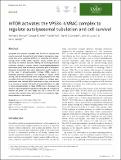mTOR activates the VPS34-UVRAG complex to regulate autolysosomal tubulation and cell survival
Abstract
Lysosomes are essential organelles that function to degrade and recycle unwanted, damaged and toxic biological components. Lysosomes also act as signalling platforms in activating the nutrient-sensing kinase mTOR. mTOR regulates cellular growth, but it also helps to maintain lysosome identity by initiating lysosomal tubulation through a process termed autophagosome-lysosome reformation (ALR). Here we identify a lysosomal pool of phosphatidylinositol 3-phosphate that, when depleted by specific inhibition of the class III phosphoinositide 3-kinase VPS34, results in prolonged lysosomal tubulation. This tubulation requires mTOR activity, and we identified two direct mTOR phosphorylation sites on UVRAG (S550 and S571) that activate VPS34. Loss of these phosphorylation sites reduced VPS34 lipid kinase activity and resulted in an increase in number and length of lysosomal tubules. In cells in which phosphorylation at these UVRAG sites is disrupted, the result of impaired lysosomal tubulation alongside ALR activation is massive cell death. Our data imply that ALR is critical for cell survival under nutrient stress and that VPS34 is an essential regulatory element in this process.
Citation
Munson , M J , Allen , G F G , Toth , R , Campbell , D G , Lucocq , J M & Ganley , I G 2015 , ' mTOR activates the VPS34-UVRAG complex to regulate autolysosomal tubulation and cell survival ' , EMBO Journal , vol. 34 , no. 17 , pp. 2272-2290 . https://doi.org/10.15252/embj.201590992
Publication
EMBO Journal
Status
Peer reviewed
ISSN
0261-4189Type
Journal article
Description
Funding provided by: Wellcome Trust Technology Platform 097945/B/11/Z, MRC Next Generation Optical Microscopy MR/K015869/1, Medical Research Council, Division of Signal Transduction Therapy Unit (AstraZeneca, Boehringer‐Ingelheim, GlaxoSmithKline, Merck KGaA, Janssen Pharmaceutica and Pfizer).Collections
Items in the St Andrews Research Repository are protected by copyright, with all rights reserved, unless otherwise indicated.

